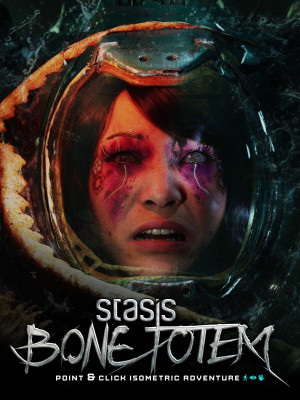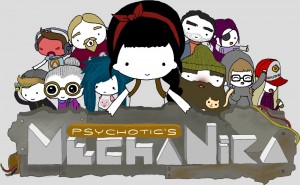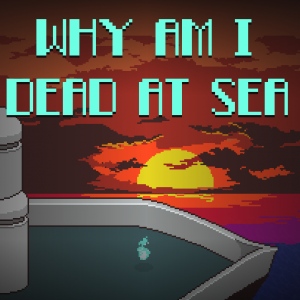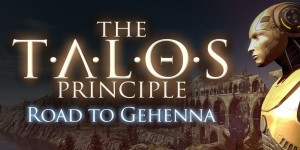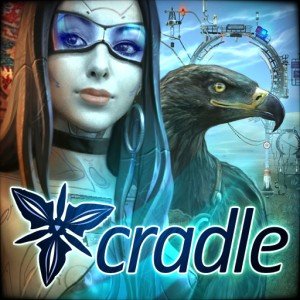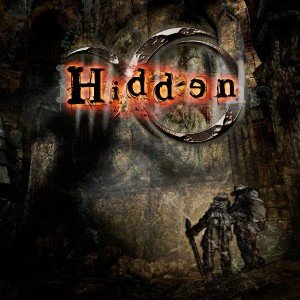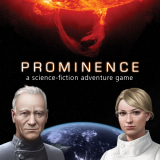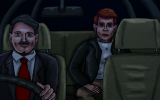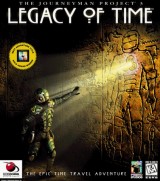Review for Sun Dogs
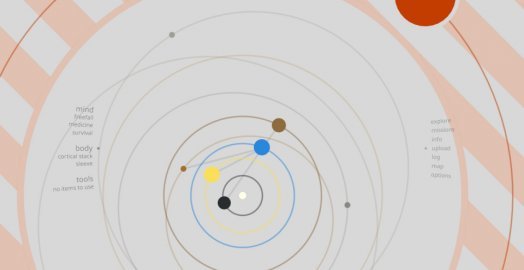
What if librarians were little creatures that scutter up your back to transfer information? In Sun Dogs, this is just one of the peculiarities of a fantastic world of body modifications – enhanced hearing, carapaces, tissue regeneration – in which technology has simultaneously given humans eternal life while at the same time removing any concept of heaven. This transhumanist interactive story set in a future version of our solar system falls somewhere between a visual novel and text adventure, and is one the most interesting narrative experiences to come out this year.
You are an insignificant human being who awakes into this cosmos with the sole purpose of exploring it. Using a minimalist 2D graphical map of our solar system, you can travel freely in your pod to various planets, moons and asteroids, extending roughly from Mercury to Mars. The map can seem eerily static at first, with travel consisting solely of pointing-and-clicking on various planets to transport there instantly. However, there are exceptions. Zoom in close and you can see satellites orbiting around, say, Venus, to which you can travel as well. And any time you move between planets you’ll be given the time it’s taken to get there, and the orbital position of all celestial objects will have changed accordingly.
The rest of the interface is wholly text. For each place you visit, you essentially have only one button to press: explore. Four times out of five you’ll be given a terse paragraph or two, usually capturing a singular scene on that planet, then your only option will be to ‘continue’ to the next 'explore' button in search of more text. Only occasionally will you be given a choice of what actions to take; sometimes you might automatically pick up an item. You can even die, though death is not permanent either for your character or you, the player, in Sun Dogs. You can manually upload a backup of your mind at various facilities, saving all choices and experiences to be exported into another body upon death, while losing all body modifications and tools you have collected.
Besides the 'explore' button, the only other relevant features displayed on the spartan white backgrounds are non-interactive lists of mind and body enhancements you have installed. You can also receive summaries on each planet, moon or asteroid by clicking the 'info' button, as well as reviewing all text revealed so far by using the game's log.
That Sun Dogs has a very limited design is by no means a criticism, though. It is going for a very specific aesthetic: distant, sparse, sombre, ambiguous. And you are merely a nondescript observer, with a self-chosen moniker rather than a name, living eternally and seemingly purposelessly. The universe seldom appears attractive, instead characterised by arbitrary inequality, devastating war, and the false utopia of transhumanism. Everything about it seems distinctly unromantic and out of your control, and naturally the gameplay is similar. You have the freedom to travel, but don’t get any ideas that you are anything more than a tourist. The writing is prosaic, providing a detached and uninvested depiction of your surroundings, which creates a peculiar contrast between the confusing state of the world and the matter-of-fact prose used to describe it. There is no grand adventure, just inconsequential self-contained scenes you come across and are left to interpret.
This is what makes Sun Dogs so engaging: it is in essence a compilation of various snapshots of life across the solar system, and as the player you get to decipher this unfamiliar world by observing these independent events. Perhaps my favourite experience was when my character happened upon a church whose construction was based on what is described as ‘antique designs’. The protagonist naturally approached the door, but was perplexed when it wouldn’t open. For a few seconds I was equally perplexed – until I realised that he (or she, or it as you choose to identify with your character) simply couldn’t comprehend the antiquated idea of manual doors. Such brief, wonderful moments give this game its essential character.
It is these often trivial but quite telling details that build such a fascinating world: when your character gets a headache you find out he’s able to just turn off his pain receptors, then the next moment you may come across a dead Jovian and notice he is without a cordial stack, the body implant that allows people to be resurrected in new bodies. Such body modifications, as well as the various tools you pick up, play a notable role in the game. Although having no immediate bearing on things, in that you can’t use them unless prompted, once you’ve acquired them they do seem to affect the encounters you have, such that each playthrough is woven in subtly different ways. At one point, for instance, you acquire a canister of oxygen. If you happen to encounter a Jovian refugee starved of oxygen, the game gives you the choice to help them out. These kinds of encounters are many, and the impact is enough to warrant more than one playthrough.
Structurally, most of the game consists of free exploration where you’re aimlessly exploring planets, but you are nudged into a loose order by the game’s six or so ‘missions’. These are more like short fetch quests, and admittedly feel a bit at odds with the game’s otherwise ungame-like format, but they are mostly optional as Sun Dogs follows no linear path. The missions range from semi-tedious to impressive. Three tiresome times you have to fetch a heart for an ostensibly dying creature who had theirs stolen, the symbolism of which I never quite worked out. But on one occasion you have what is the only meaningful interaction with another person in the entire game, and it’s all the more potent because of it. You come across a ceramic disc marked ‘Laurett’ in an old revival room (a place that resurrects people when their ‘sleeve’, or body, dies). In searching for what this disc means, you’ll discover a person working in a museum, ‘old with wrinkled and spotted skin’. The protagonist wonders ‘why they have not changed sleeves’; and you get taken on an oddly moving trip through this man’s past, the details of which are best left to find out for yourself.
There is one caveat to my appreciation of this mission. When I encountered it on my first playthrough, I didn’t get to finish. Instead, halfway through a message popped up: ‘Nothing was found here. Check the game’s story folder.’ Unfortunately this was one of three times such an error happened to me. (And neither was it the only bug; sometimes a bit of text might be cut off, for instance, but these were cosmetic and therefore forgivable.) You can still carry on playing after the bug, but the mission ends prematurely and you have to restart the game from the beginning to find out what was meant to happen. Alternatively, you can do what I did, which is to rummage through the game’s ‘story’ folder and read through the files for that mission – a testament at the very least to how interested one can become in the game’s world.
Access to the story folder brings up one of the odder selling points for this type of game, in that it is fully moddable. Although only superficially investigating this feature, as a non-programmer I found the game just about manageable to modify. You can fairly easily add new missions or text, building on the world already created. Certainly I hope people will; the world is just explained enough to give a firm grounding in its lore and just ambiguous enough to give potential modders plenty of space to expand.
It’s this kind of balance that serves Sun Dogs so well throughout its roughly two-hour play time. You are presented with a world to explore, written in a direct, no-nonsense fashion, but one that is intrinsically peculiar and only ever presented to you in fragments. It holds just the right level of interest for such a freely-structured game, such that all those interested in exploration-based games or hard sci-fi will find travelling round this solar system a magnetic experience, so long as you don’t expect a traditional adventure, even for Interactive Fiction. Occasional bugs, some more severe than others, and the odd inclusion of varying-quality ‘missions’ do hold the game back. But they certainly don’t take away the fact that this is an innovative narrative experience, one depicting a transhumanist dystopia that will surely captivate most players with its excellence in world building.



